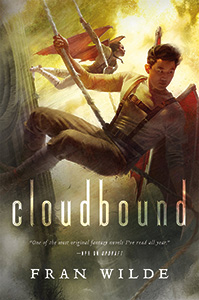Liz Bourke Reviews Fran Wilde
Cloudbound, Fran Wilde (Tor 978-0765377852, $25.99, 400pp, hc) September 2016.
 Fran Wilde, the mind behind the podcast Cooking the Books, burst onto science fiction and fantasy bookshelves last year with her debut novel Updraft. And not just onto bookshelves: nominated for a Nebula, winner of the Andre Norton Award, winner of the Compton Crook Award, Updraft has been making quite a few waves. (It is, to my knowledge, the only debut novel ever to be nominated for the Nebula and the Andre Norton in the same year.)
Fran Wilde, the mind behind the podcast Cooking the Books, burst onto science fiction and fantasy bookshelves last year with her debut novel Updraft. And not just onto bookshelves: nominated for a Nebula, winner of the Andre Norton Award, winner of the Compton Crook Award, Updraft has been making quite a few waves. (It is, to my knowledge, the only debut novel ever to be nominated for the Nebula and the Andre Norton in the same year.)
Now here comes Cloudbound, Wilde’s second novel, set in the same world as Updraft and following on directly from its events, but told from the point of view of a different character. Where Updraft was narrated by Kirit, whose talents and inclinations made her a catalyst for conflict between the Singers – a central authority in her society – and everyone else, and one of the fulcrums around which that conflict turned, Cloudbound is narrated by Nat, Kirit’s childhood friend. Nat, like Kirit, is still not 20 yet, but he’s been catapulted into a leadership role as the junior councillor for Densira tower. His inexperience with politics leaves him open to manipulation, and he realises only slowly that other ambitious people are, at least in part, stage-managing the threats to and division within his society – but once he realises, he is compelled to act.
Cloudbound builds on the foundations that Updraft established. They are both, in their way, novels about coming of age. Wilde has pulled off a neat trick to give us in Nat a character very different from Kirit, but one equally compelling, to show us the characters of the first novel from a different perspective, and yet have them all remain recognisable and consistent. And to introduce new characters, all of them distinct and deftly characterised, so that Cloudbound feels both more crowded and yet more lively than its predecessor. From Nat’s fellow members of an apparent (low-key) romantic triad, Ceetcee and Beliak, to the scavenger-fighter Aliati and the crippled scientist Djonn, the politicians Doran and Hiroli, Kirit and Wyk, and the young teenagers Ciel and Moc – and the rest of a cast who come alive in its pages – one of Cloudbound’s delights is its people, and their very human combinations of selfishness and selflessness, judgment and generosity, loyalty and self-interested treachery.
After the disruptions of Updraft, the aerial society of the bone towers – where people use human-made wings to travel from place to place, where life is precarious, and where monsters lurk in the clouds below – is on edge. Stability is precarious, and everyone is looking for someone to blame for the continuing problems. The discredited Singers are a useful scapegoat, and Nat is initially supportive of the idea that the solution to the unrest is to execute all the surviving adult Singers.
Fortunately for the narrative, he comes around to a less ethically challenged way of thinking, when he begins to discover that multiple political factions – but one in particular – are contributing to the unrest in order to gather power into their own hands. First accident, then investigation, leads Nat and his allies into the clouds: a hazardous realm filled with monsters, secrets, and the remnants of the past. Pursued by dangerous enemies, the need to survive drives him and his family and allies – some more reluctant than others – deeper than anyone has been in years. There, they make a discovery that has the potential to shake the foundations of their world.
Wilde’s worldbuilding remains one of Cloudbound’s delights. The revelation at the novel’s conclusion – which I will not spoil, because it’s worth coming to in its own good time – of what the bone towers actually are is a perfect example. But throughout Nat’s sojourn in the clouds, the slow revelation of the world below the clear air of tower society comes with a damp and atmospheric logic, a lowering sense of threat and claustrophobia, that adds immeasurably to the novel’s tension.
And, damn, does this novel have tension. In terms of pace, style, structure, and sheer flair? Cloudbound represents the opposite of a sophomore slump. It’s that rare bird, the follow-up to a highly praised first novel that doesn’t just equal its predecessor’s accomplishments, but exceeds them. I felt Updraft was a promising debut effort; Cloudbound sees much of that promise realised, with hints of more to come.
I could laud Cloudbound further, but the only thing I disliked about it is that it ends on something of a cliffhanger. What happens next?
I don’t know – but I do know I really want to stick around to find out.





